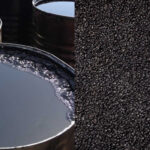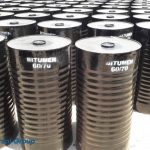
Best Bitumen Grades for Hot Climates: A Guide to Sustainable Infrastructure
Best Bitumen Grades for Hot Climates: In regions with extreme heat and high solar radiation, standard bitumen grades can soften, bleed, or deform. This leads to road failures, rutting, and increased maintenance costs. Choosing a temperature-appropriate bitumen grade is essential for the longevity and stability of roads, airports, and industrial surfaces.
In this blog post, we dive into the significance of bitumen in hot climates and explore the role of Peak Universal as a trusted supplier in providing sustainable solutions for infrastructure projects.
Understanding Bitumen:
Bitumen, commonly known as asphalt, is a highly viscous and sticky black substance derived from the distillation of crude oil. It serves as a binding agent in asphalt concrete, commonly used in road construction, waterproofing, and roofing applications. Bitumen exhibits excellent waterproofing properties and provides flexibility, strength, and resistance to wear and tear, making it an ideal choice for various infrastructure projects.
🌡️ Why Climate Matters in Bitumen Selection
Performance Under High Temperatures
In hot regions, the pavement surface can reach 60–70°C or higher. Bitumen used here must:
-
Resist softening and flow
-
Maintain shape and adhesion
-
Withstand UV degradation
-
Prevent rutting and deformation
Hot climates pose unique challenges to infrastructure due to extreme temperatures, intense sunlight, and prolonged exposure to UV radiation. These conditions can accelerate the aging and deterioration of asphalt surfaces, leading to cracking, rutting, and pavement distress. Choosing the right grade of bitumen becomes imperative to mitigate these issues and ensure the longevity and performance of roads, highways, and other structures.Importance of Bitumen in Hot Climates.
Grade Selection for Hot Climates:
In hot climates, the selection of bitumen grades with higher softening points and enhanced resistance to temperature fluctuations is crucial. Typically, polymer-modified bitumen (PMB) or modified bitumen is preferred for hot climate regions. PMB offers superior properties such as improved elasticity, deformation resistance, and thermal stability, making it well-suited for withstanding the rigors of high temperatures.
🧪 Top Bitumen Grades for Hot Climates
| Bitumen Grade | Type | Softening Point | Main Use |
|---|---|---|---|
| VG-40 | Viscosity Grade Bitumen | ~55–65°C | Heavy-traffic roads in hot climates |
| PG 76-22 / PG 82-22 | Performance Grade Bitumen | 76–82°C | Highways, runways in tropical zones |
| PMB (Polymer Modified) | Modified Bitumen | ≥80°C | High-load zones, bridges, hot areas |
| Oxidized Bitumen 115/15 | Industrial (Blown) Bitumen | ~115°C | Waterproofing, tank lining, insulation |
🏗️ Grade Highlights & Benefits
1. VG-40 (Viscosity Grade Bitumen)
-
Designed for high-temperature conditions
-
Higher viscosity than VG-30
-
Commonly used in India, Middle East, and African highways
✅ Best for: Heavy-duty roads, expressways, hot urban climates
2. PG 76-22 or PG 82-22
-
Based on Performance Grading (Superpave) system
-
Indicates it performs well at 76°C or 82°C max pavement temperature
✅ Best for: Airports, runways, freeways, tropical climates
3. Polymer Modified Bitumen (PMB)
-
Enhanced with SBS or EVA polymers
-
Offers elastic recovery, higher softening point, and resistance to cracking
✅ Best for: High-load zones, flyovers, bridge decks in hot areas
4. Oxidized Bitumen 115/15
-
Used for industrial applications, not roads
-
Withstands heat, chemicals, and mechanical stress
✅ Best for: Insulation, waterproofing in hot industrial environments
📋 How to Select the Right Grade for Your Project?
| Application | Recommended Bitumen |
|---|---|
| Highway construction | VG-40, PG 76-22 |
| Airport runways | PG 82-22, PMB |
| Industrial waterproofing | Oxidized Bitumen 115/15 |
| Seismic or load zones | PMB |
| Regular urban roads | VG-30 or VG-40 |
Peak Universal; A Trusted Supplier of Bitumen Solutions:
When it comes to sourcing high-quality bitumen for infrastructure projects in hot climates, Peak Universal emerges as a reliable partner. With a strong focus on sustainability, innovation, and customer satisfaction, Peak Universal offers a diverse range of bitumen products tailored to meet the specific requirements of hot climate regions.
Peak Universal’s Commitment to Sustainability:
Peak Universal is committed to sustainable practices throughout its operations, from sourcing raw materials to manufacturing processes and product distribution. By prioritizing environmental management and resource efficiency, Peak Universal minimizes its carbon footprint and contributes to the advancement of sustainable infrastructure development.
Innovative Solutions for Hot Climate Challenges:
Peak Universal’s portfolio includes advanced polymer-modified bitumen formulations designed to excel in hot climate conditions. These innovative solutions offer superior resistance to high temperatures, oxidative aging, and moisture ingress, ensuring long-term performance and durability of infrastructure assets.
Success Stories with Peak Universal Bitumen:
Multiple infrastructure projects around the world have benefitted from Peak Universal’s expertise and premium bitumen solutions. From highways and airports to residential developments and industrial complexes, Peak Universal’s products have proven their mettle in challenging hot climate environments, delivering exceptional results and surpassing performance expectations.
❓ Frequently Asked Questions (FAQs)
Q1: Which bitumen grade is most suitable for extremely hot climates?
Polymer Modified Bitumen (PMB) and PG 82-22 are ideal for extremely hot climates due to their high softening point and flexibility.
Q2: Can VG-30 be used in tropical climates?
VG-30 can be used, but VG-40 offers better thermal stability and is recommended for consistently hot weather.
Q3: Is oxidized bitumen used in road construction?
No. Oxidized bitumen is mainly used in waterproofing, roofing, and industrial insulation, not for road paving.
Q4: How does PMB compare to traditional penetration grades?
PMB offers superior temperature resistance, elasticity, and durability, especially in high-stress environments.
🧾 Conclusion
In hot climates, using the wrong bitumen grade can lead to costly failures. For optimal performance:
-
Use VG-40 for highways
-
Choose PG 76-22 or 82-22 for performance-based needs
-
Select PMB for critical structures or high-load areas
-
Apply Oxidized Bitumen for industrial insulation or waterproofing in hot zones
Careful grade selection ensures pavement durability, low maintenance, and cost-effectiveness.
By prioritizing sustainability, quality, and customer satisfaction, Peak Universal remains at the forefront of driving sustainable infrastructure development worldwide, one road, one building, and one community at a time.
You can Read More about this product Here: Bitumen & Asphalt
Which Weather Conditions are Suitable for Bitumen 6070?
Importance of Viscosity Grade Bitumen in Industry
Uses of Oxidized bitumen 85/25
What are the grades of bitumen?
📞Call to Peak Universal Business
Need expert advice on selecting the right bitumen grade for hot climates?
👉 Contact us today for product specifications, pricing, and technical support tailored to your project.
📧 Email: [email protected]
📞 Phone: +971 4 878 2031
🌐 Visit: PUBLtd. Bitumens & Asphalts
If You have any other Query or Question you want to ask, Please don’t hesitate to Contact Us.
- 0 comment





Leave a Reply